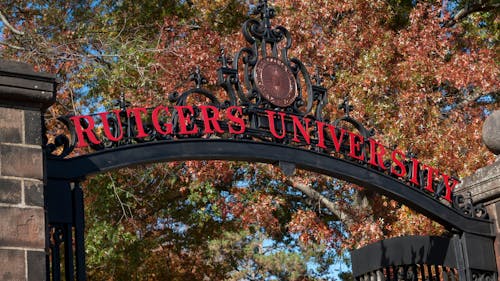Rutgers students, nonprofit organization say vaccine mandate is unconstitutional in lawsuit against U.

A group of 18 Rutgers students, alongside the nonprofit organization Children’s Health Defense, filed a lawsuit in federal court on Monday against the University regarding its coronavirus disease (COVID-19) vaccine mandate, according to an article from NJ Advance Media.
The student Plaintiffs include Peter Cordi and Adriana Pinto, both School of Arts and Sciences seniors, Raelynne Miller, a School of Nursing junior, Jake Bothe, a School of Engineering sophomore, and Kayla Mateo, as well as 13 others who chose to withhold their names, according to the verified complaint.
The Defendants named in the complaint include the University, the Board of Governors, the Rutgers School of Biomedical and Health Sciences (RBHS), University President Jonathan Holloway and RBHS Chancellor Brian L. Strom.
Plaintiffs are alleging that Rutgers’ COVID-19 vaccine mandate policy is illegal and unconstitutional, not authorized by federal or state law and violates the rights to informed consent and to refuse unwanted medical treatment, according to the complaint. They list several laws and requirements they believe are violated by the policy, including the Fourteenth Amendment and Article I of the New Jersey Constitution.
“Fundamentally, the policy is an affront to human dignity and personal freedom because it violates our basic right to control our bodies,” the Plaintiffs state in the complaint. “In a free society, all people have the right to decide their own medical treatment — especially, to decide what to inject into their bodies. And every person has the right to make that decision voluntarily, free from coercion by anyone, and to be fully informed of the benefits and especially the risks of that decision.”
The lawsuit also mentions how the University had said prior to announcing the requirement that they would not mandate the vaccine and states that the students faced damages as a result of its actions and are seeking compensation, according to the article.
“Rutgers University cannot make that decision for its students by coercing them to get an experimental COVID-19 vaccine to return to campus and to continue their studies,” the Plaintiffs stated in the complaint. “Rutgers students face a dilemma: take an experimental vaccine and risk injury and death — or abandon academic studies at Rutgers.”
University spokesperson Dory Devlin said the University’s position on vaccines is consistent with the legal authority supporting the policy.
“We are committed to creating a safe campus environment in fall 2021, and to support the health and safety for all members of the Rutgers community, the University updated its existing immunization requirements for students to include the COVID-19 vaccine,” she said.
The University announced back in March that they would require COVID-19 vaccination for all students looking to return to campus in the fall, with exemptions available for medical and religious reasons, The Daily Targum reported. In a previous conversation with the Targum, Executive Vice President Antonio M. Calcado said the University made the decision then so individuals could take time to make informed decisions about their fall plans.
While Rutgers was one of the first universities in the U.S. to mandate the COVID-19 vaccine, nearly all colleges and universities in New Jersey are now doing the same, according to an article from Patch.
With these mandates have come similar lawsuits from students and organizations across the country, with one emergency request recently landing at the Supreme Court, according to an article from NJ Advance Media. After reviewing the request from several Indiana University students, Justice Amy Coney Barrett declined to block the school's plan to mandate COVID-19 vaccination for all students and employees.
Holloway announced in an email on Monday that student compliance with the vaccine requirement has now reached 99.5 percent, which includes approximately 1.2 percent of 71,000 students who received medical or religious exemptions.



